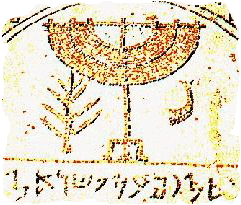Glossary

Having trouble understanding the Hebrew and special terms used on the Ebionite Community pages? Even if you are just curious, here is the glossary you need. You also need the Evyoni fonts to correctly view this page.


Pick A Letter! Save some time. Rough English/Hebrew equivalent sounds are grouped together (example: t/taw/tet; 'alef and `ayin are found with A).
A B C D E F G H I J K L M N O P Q R S T U V W X Y Z H X S C
SOURCES INCLUDE:
Samuel, Edith. Your Jewish Lexicon. New York: UAHC, 1982.
Eisenman, Robert. The Dead Sea Scrolls and the First Christians: Essays and Translations. Rockport: Element, 1996. Pp. 423-32.
*Terms may feature the transliteration systems used in their sources and can vary. Mistakes are my own as definitions have been supplemented and some transliterations have been altered from the original. Other additions appear in square brackets [thus]
H
h
ag sameah
a happy holiday (used as a greeting)hayav
one who is obligated.hazzan
cantor.hahamim
Chachamim. Sages.herem
excommunication (from cessation of aid, boycott); in ancient times, "put under the ban"; devoted through total destruction to Yahweh.
hesed
loving-devotion, kindness.heshbon hannefesh
(lit. accounting of the soul) self-examination of your actions' merit, or accounting of your soul's good and bad aspects.hevra
Friends, comrades, associates joined in purpose.Hevra Qadisha
(lit. holy society) the group that prepares a body for burial.hillul ha-shem
misuse, desecration of the divine name.hiyuv
obligation.hittif
"pouring out"/"spouting"; as in CD, viii.13's "of Lying". For CD, 1.14f. "the Man of Scoffing" (or "the Comedian") "poured out on Israel the waters of Lying leading them astray in a trackless void without a Way", which combines "Lying", "Jesting", "Spouting", and 'leading astray" imageries with inverted allusion to "wilderness" and "Way" terminologies; see "Mattif"/"Mattif ha-Chatzav".hoq (pl., huqim)
law from the Torah seemingly without a humanly discernible rationale, e.g., the red heifer.
hok, "statute" or "Law"; at the heart of 1QS, viii4x's exposition of Is 40:3's "Way in the wilderness", "the Way" being "the study of the Law". The phrase, "zealous for the Law", specifically occurs in ix.23 accompanied by reference to "the Day of Vengeance"; cf. "qin'at Mishpetei-Zedek" in iv.4. Note CD, i.20's "yafeiru hok" to describe the "pursuit after" the Zaddik---the synonym of 1QpHab, ii.6's Mefirei ha-Brit echoed too in 1QpHab, viii.17.hamato "his wrath"; in 1QpHab, xi.5f., the "angry wrath" with which "the Wicked Priest pursued the Righteous Teacher". Though thought in xi.14f. to relate to his "drunkenness", the allusion, which plays on and inverts xi.6's imagery of "anger" and "consuming", is to that Divine "Cup of Wrath" which would be "poured out" upon the Wicked Priest. Cf. Rev 14:9f. in precisely this vein: "He shall drink the Wine of God's Wrath poured unmixed into the Cup of His Anger, and he shall be tormented in Fire and brimstone ..." For the latter image see 1QpHab, x.5 (also relating to the Wicked Priest): "He will judge him with Fire and brimstone."
hamex
leavened food, which is forbidden during Pesah.humash
the five books of the Torah, bound in one volume (not a scroll; usually contains commentary and Haftarot.humra
stringency -- custom of a community to observe more strictly.
T
tahara (pl. taharot)
ritual purity.takkanah; taqqanah (pl. taqqanot)
correction; a rabbinic edict that supersedes the existing halakah.Tamim/Tamimim
"the Perfect"; also sometimes, "Perfection"-a fundamental notion at Qumran based on references to Noah in Ge 6:9 as "Righteous and Perfect in his Generation"; the relationship to the parallel New Testament notation (cf. Mt 5:48, 19:21, Ja 1:4,, 17, 25, 2:22, etc.) is intrinsic.To'evot
"Abominations"-Darkei-To'evot "Ways of Abominations" in 1QpHab, viii.12f. Here and in xii.8, those of the Wicked Priest, particularly his "pollution of the Temple"/ "Temple treasure" through violent tax-collecting and "robbing the Poor". Part and parcel of the language of "polluting the Temple"/'breaking the Covenant" in Ezek 44:6ff.; in the Temple Scroll, related to forbidden foods (xlviii.6), marriage with nieces (lxvi.1 If.; also referred to as "niddah"), and Gentiles (lx.17ff. and lxii.16).Tom
"Perfect"/"Perfection"; Tom-Derek/ Tamimei-Derek, "Perfection of the Way"/"the Perfect of the Way"; also linked to expressions based on Is 40:3 like "Yisharei-Derek", "the Straight" or "Upright of the Way".tame'
ritually unclean.tum'ah/ teme'
(ha-Miqdash, /yitame' et Miqdash-El "pollution"/"pollution of the Temple of G-d", generally tied to a demand for "separation" (cf. 11QT, xlvi.9ff. and CD, iv.17ff.); with "To'evot" part and parcel of the charges relating to the admission of foreigners into the Temple in Ezek 44:7, as well as in consonant "Zadokite"/"Zealot" ideologies. As used in 1QpHab, xii. 8f., directed against the Wicked Priest who did not "circumcize the foreskin of his heart" Ezek 44:9), and in viii.13, 1QS, v.19f., and CD, xii.1f. linked to "niddah".tanak
(TN"K; Tanakh; Tanach; Tenach) acronym for Torah Nevi'im K'tuvim - Torah, Prophets, Writings-- the three divisions of the (Hebrew) Bible.tana'im
Sages of the Mishnaic period.tefillah
prayer.teshuvah; t'shuvah
return, i.e., repentence to obedience toward Yahweh via His Torah.t'hillim; tehillim; t0jill9m
Praises (psalms).tiqqun `olam
correcting the world, repairing the world; an action promoting social justice; acknowledgement of a partnership with Yahweh as good stewards of His creation.torah misinay
(lit., Torah from Mount Sinai) refers to a doctrine that the entire Torah, including the Oral Law, was given to Mosheh at Mount Sinai.torah she-b`al peh; torah sh'b'al peh
lit. "torah that is of the mouth"; Oral Tradition (or Law)(=Talmud and Rabinnical).torah sh'biktav
torah that is written, ie., the five books of the Torah: Ber'shit, Shemot, B'midbar, Wayyiqra', Haddevarim (Genesis, Exodus, Numbers, Leviticus, Deuteronomy).treif; treifah
(literally, torn; refers to non-kosher food.
X
tzniut; x0n9'-t
Proper modesty.Xaddiq/Xaddiqim
"the Righteous"/"the Righteous One(s)"; the terminology is highly developed in Jewish Kabbalah and Jewish Resurrection theory Via the Is 53:11 "yazdik-Zaddik" conceptuality, the basis of "Justification" theorizing, Qumran's esoteric exegesis of Ezek 44:15, and the "purist Sadducee" Movement.Zedek
"Righteousness"; with Hesed, the fundamental notation at Qumran. Taken together these two represent the basic ideological orientation of all "Opposition" groups in the Second Temple Period; the second of the two "all Righteousness" Commandments, i.e., "loving one's neighbor as oneself" or "Righteousness towards one's fellow man", which moves easily into a consonant demand for economic equality and an insistence on poverty.tzedakah; xedaqaj
righteousness; used for charitable donations, though the root has a very different sense from the root of "charity."
Zedakah
, Also translated as "Righteousness", but having the form of a verbal noun implying something of the sense of "Justification", i.e., in place of sacrifice, one "was justified" by charity.
V
Vayikrah
Wayyiqra'; (lit. "and He called") 3rd book of the Torah (Leviticus).
Y
YHWH; Yahweh
Ha-shem (the Name); the sacred name of the King of the Universe, Creator and Sustainer of all things. The short form of the Name is Yah.
yazdik-Zaddik
(yazdiku-Zaddikim) the "Justification" ideology at Qumran based on the terminology of Is 53:11 (and to a lesser extent, Is 5:23); cf. also its use in Dan 12:3 above and see "Zaddik" and "Zedakah" below.yazzilem/ yazzilum
"save them"/"be saved"; the language of "Salvation", associated with the language of the "House of Judgement"/ "Day of Judgement". The first in 1QpHab, viii.1f's exegesis of Hab 2:4 refers to the "Salvation of the Righteous"; the second in xii.14ff., the condemnation of "the Servants of Idols (Gentile Idolators) and Evil Ones" (here backsliding Jews; cf. 2 Pe 2:9 and 3:7).yehalluhu
"pollute it". This plural usage is attached to the singular allusion to "bala'"/ "Bela'" in 11QT, xlvi.11 and forms the background to "the Zadokite Statement" in Ezek 44:6ff., where the ban on "bringing strangers uncircumcized in heart and flesh into My Temple to pollute it" is enunciated.Yeter ha-'Amim
"the Remnant" or "Additional Ones of the Gentiles"; in 1QpHab, ix.7 specifically identified with "the Army of the Kittim", i.e., the Romans; see 'Amim.yikboz
"gathering"; in 1QpHab, viii.11 and ix.5 having to do with the Darkei To'evot or "gathering" activities of the Wicked Priest/Last Priests via the instrument of Unruly Gentiles; in this context "gathering" wealth- see also losif.Yom ha-Mishpat "Day of Judgement", linking up with the usages "Mishpat"/ "Beit ha-Mishpat' and "yazzilem"/"yazzilum" and used eschatologically in 1QpHab, xii.14 and xiii.2f., i.e., "on the Day of Judgement God would destroy all the Idolators and Evil Ones from the Earth".
yasher koah
(lit. meaning unclear, but possibly "straight strength") used idiomatically to express praise or thanks for serving in a religious or ceremonial role. Implies "May your stength continue, go on straight"; i.e., "You done good! Do it many times more!"
Z
zamam/ zammu
"conspired"; in 1QpHab, xii.6 relating to the Wicked Priest's judicial conspiracy "to destroy the Righteous Teacher"/"Poor"/"Simple of Judah doing Torah". In 1QH, iv.7ff. The usage applies to both "the Sons of Belial" (Herodians) and their "nets", not to mention all "Scoffers of Deceit"/"Scoffers of Lying" (Malitzei-Chatzav) who lead the people astray "with Smooth Things", "give vinegar to the thirsty", and whose "works are boasting".zanut
"fornication", one of "the Three Nets of Belial"; in CD, iv.1 7ff. marrying nieces and divorce; in viii.5 tied to Riches and incest. Part and parcel of James' directives to overseas communities (cf. too Ja 1:14f., 4:1ff., and Rev 2:14), the imagery of which pervades Qumran; e.g., 1QS, iv.10's "zeal for lustfillness, "ma'asei-To`evot" in a spirit of zanut, and darkei-niddah in the service of pollution" and par contra 1QpHab, v.4ff's Elect of God "not lusting after their eyes" (cf. 2 Pe 2:13f.).zt"l
(acronym, zikron tzaddiq livraka; lit. the memory of a tzaddiq is a blessing) honorific appended to the names of dead rabbis and righteous people.z"l
(acronym, zikrono (fem. zikronah) livrakah; lit. may his/her memory be a blessing) appended to the names of those who have died.